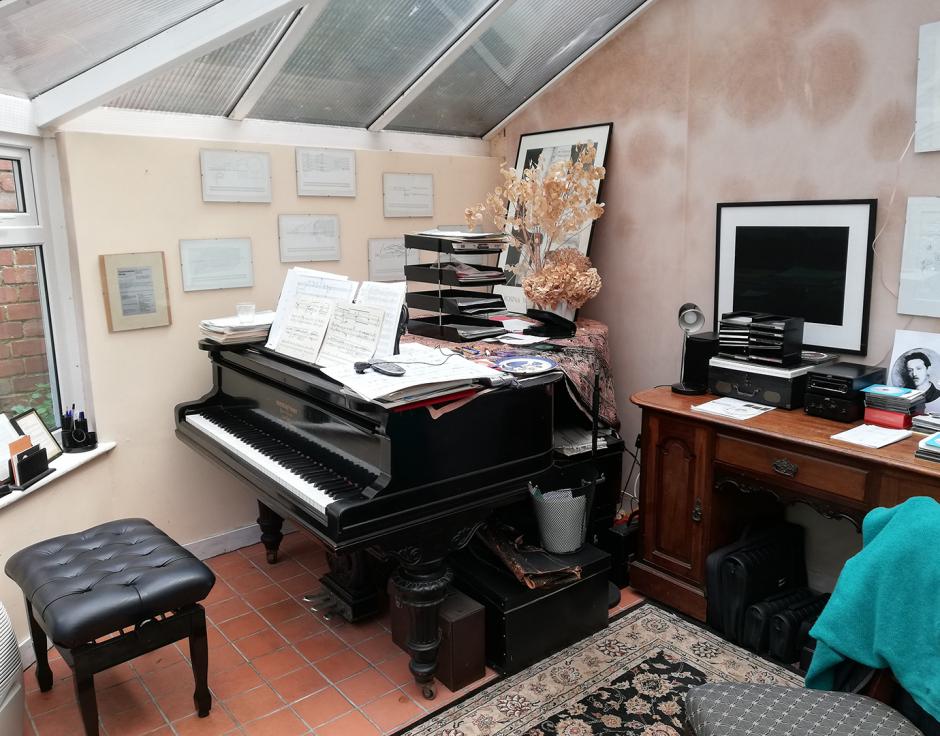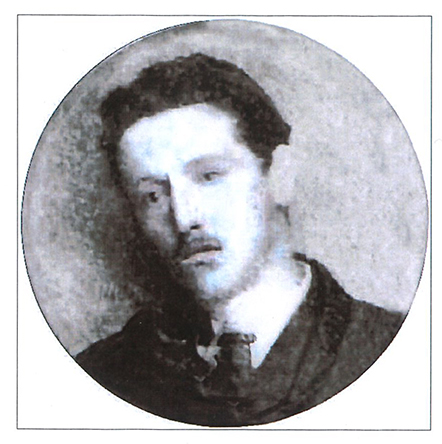The pub pianist's grandchild: a conversation with John Tilbury
July 2022

John Tilbury's studio in Deal, Kent. Photo: Clive Bell
In a coda to the AMM feature in The Wire 461, pianist John Tilbury tells Clive Bell a personal story of the much-admired musical grandfather he never met
Interviewing AMM pianist John Tilbury for The Wire in his house in Deal, Kent, I arrive with my list of questions scribbled in a notebook. I have an agenda, but it becomes clear that Tilbury has one, too. After submitting graciously to my questions for over an hour, Tilbury lunges towards a grainy, circular photograph, like a blow-up from an old family portrait. Propped up on an antique wooden desk, it shows a youngish man with a moustache, staring downwards with a bewildered, otherworldly expression.
“This guy here, I'm obsessed with him.” Tilbury is talking urgently, words tumbling out. “When I did Lessness for [Cafe] Oto, it's dedicated to him.” During lockdown, Tilbury recorded a 30 minute version of Samuel Beckett's text Lessness for Cafe Oto's Takuroku label, titling the result Metalessness. He recites Beckett's short, spiky lines across the strange keyboard sounds of his clavichord, an instrument which now sits near to the photo. The dedication reads: “In memoriam William Thomson, potman, pub pianist who died of TB at 39 in 1914, the grandfather I never knew.” And the clavichord plays eerie chords from another age, evoking a long lost pub piano.
Tilbury launches into what little he knows of his grandfather: “I was born in 1936 and my mother was seven when he died. They lived in absolutely horrendous conditions in a ghetto in West London, actually they lived where Grenfell Tower was, in Latimer Road [the tower was destroyed by fire in 2017]. The only story my mother recounted was that when they were playing downstairs, in what I imagine to be some kind of communal parlour area, if her father needed the toilet he would bang on the floor with a stick. Woe betide her if she didn't come immediately, and give him a pot – he would put her across his knees in the bed and smack her bottom. Or he was down at the pub – that was his life. A potman [collecting glasses in a pub], also a bricklayer, and he played the piano. I mean, how the hell did he do that? I don't understand, it's incredible, maybe it's best that I'll never know.”
Tilbury himself was educated at Latymer Upper School in West London by the Thames, a far cry from Latimer Road, and studied piano at Royal College Of Music and later in Warsaw. Now he's wrestling his way back into the past, trying to reach London prior to the First World War.
“When I was young – well, I didn't have a grandfather, so what? I didn't have to think about that. Now I'm 86 I think about it! Who was this man? When he died they tried to take my nan's daughters away and put them in a home because she was too poor; but she said no, never, ‘Not while I've got these!’” Tilbury brandishes his fists. “She worked 12 hours a day in Du Cane Road Hospital – it's in Shepherds Bush – non-stop, six till six. She had bread and cheese and a half of Guinness to keep her going, then home to rustle up something for the kids.” He stops for breath. “My mother told me when she was seven, she used to go to these special social services, to get a free loaf of bread, every week. And there was a man behind a grill. It was Dickensian. He used to push this stale loaf of bread through. Some days it would go on the floor, to get you down on your knees, pick up this stale loaf and say thank you. She told me she never forgot the look of contempt on this man's face.”
During the Second World War the young Tilbury was evacuated from Harrow to Torquay in Devon. By 1945 he was nine years old. His parents decided he should have piano lessons (they had inherited an upright piano): “I had shown no particular aptitude. My mother was strict. I had to practice every day or evening before I was allowed to go out to play with my mates.” Later he became famous for interpreting John Cage, Morton Feldman and Howard Skempton, alongside improvising with AMM. He's still releasing new work regularly, the latest being his Terry Riley Keyboard Studies for Another Timbre.
Tilbury bought a clavichord in 2015 – an extremely quiet keyboard instrument; it was popular with Renaissance and Baroque musicians as a practice instrument. In the 1960s it was amplified, rechristened the clavinet, and widely employed by Stevie Wonder. Tilbury's first clavichord release was Seaside, recorded in his house with John Lely's electronics and Palestinian oud player Dirar Kalash. Seagulls and other beach sounds are just audible behind the music. On Metalessness, dedicated to his pub pianist grandfather, it's uncanny how the clavichord's wavering instability conjures up piano ghosts from a century ago.
“Of course I wonder how he managed to learn to play the piano,” continues Tilbury. “He must have played by ear. He married a barmaid, who was my grandmother. They had a daughter who was my mother. It was absolutely appalling, the life they led. When he died she was seven, and her sister was five – they managed to exist, but she told me stories about how bad it was. She said, ‘Don't talk to me about the good old days, they were bloody awful.’ She worked in a clothes factory when she was 14, where her job was to pick up pins all day long.”
Tilbury is thirsting to know more of William Thomson, but recognises it's too late. “Poor devil, dead at 39. He died of tuberculosis, having been bed-ridden for, I imagine, quite some time. They were virtually penniless. So no treatment. She never told me and I didn't ask. She never volunteered anything. I wish I'd asked her, tell me something.”
By coincidence, Tilbury's paternal grandfather also died aged 39, shot in the head by a sniper during the First World War. “Those of us whose life depended on him – there were about 20 of us – we went over to Belgium, to Ypres. A friend of mine, David Jackman, he's an amateur military historian, did an incredible amount of research about my grandfather, and he identified, within about 50 yards, where he was actually killed.” Jackman was a member of The Scratch Orchestra and releases drone works as Organum.
Now Tilbury is clutching the photo of William Thomson. “He had such a lovely face – I love his face, he looks very much like my mother. I'm sorry all this has nothing to do with AMM. Well, it has indirectly to do with being a pub pianist, which I never managed!”

Scan of a photo of John Tilbury's grandfather, as seen on Tilbury's studio desk above. Courtesy John Tilbury.
Read Clive Bell's AMM feature in The Wire 461. Wire subscribers can also read the article online via the digital magazine archive.
Leave a comment